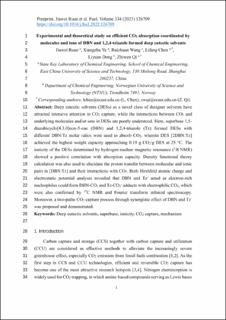Experimental and theoretical study on efficient CO2 absorption coordinated by molecules and ions of DBN and 1,2,4-triazole formed deep eutectic solvents
Peer reviewed, Journal article
Accepted version
Permanent lenke
https://hdl.handle.net/11250/3115447Utgivelsesdato
2023Metadata
Vis full innførselSamlinger
Sammendrag
Deep eutectic solvents (DESs) as a new class of designer solvents have attracted intensive attention in CO2 capture, while the interactions between CO2 and underlying molecules and/or ions in DESs are poorly understood. Here, superbase 1,5-diazabicyclo[4.3.0]non-5-ene (DBN) and 1,2,4-triazole (Tz) formed DESs with different DBN/Tz molar ratios were used to absorb CO2, wherein DES [2DBN:Tz] achieved the highest weight capacity approaching 0.19 g CO2/g DES at 25 °C. The ionicity of the DESs was determined by proton transfer from Tz to DBN and showed a positive correlation with absorption capacity. Density functional theory calculation was also used to elucidate the proton transfer between molecular and ionic pairs in [DBN:Tz] and their interactions with CO2. Both Hirshfeld atomic charge and electrostatic potential analyses revealed that DBN and Tz− acted as electron-rich nucleophiles could form DBN-CO2 and Tz-CO2− adducts with electrophilic CO2, which were also confirmed by carbon nuclear magnetic resonance and Fourier transform infrared spectroscopy. Moreover, a two-paths CO2 capture process through synergistic effect of DBN molecules and Tz− ions in the DESs was proposed and demonstrated.

